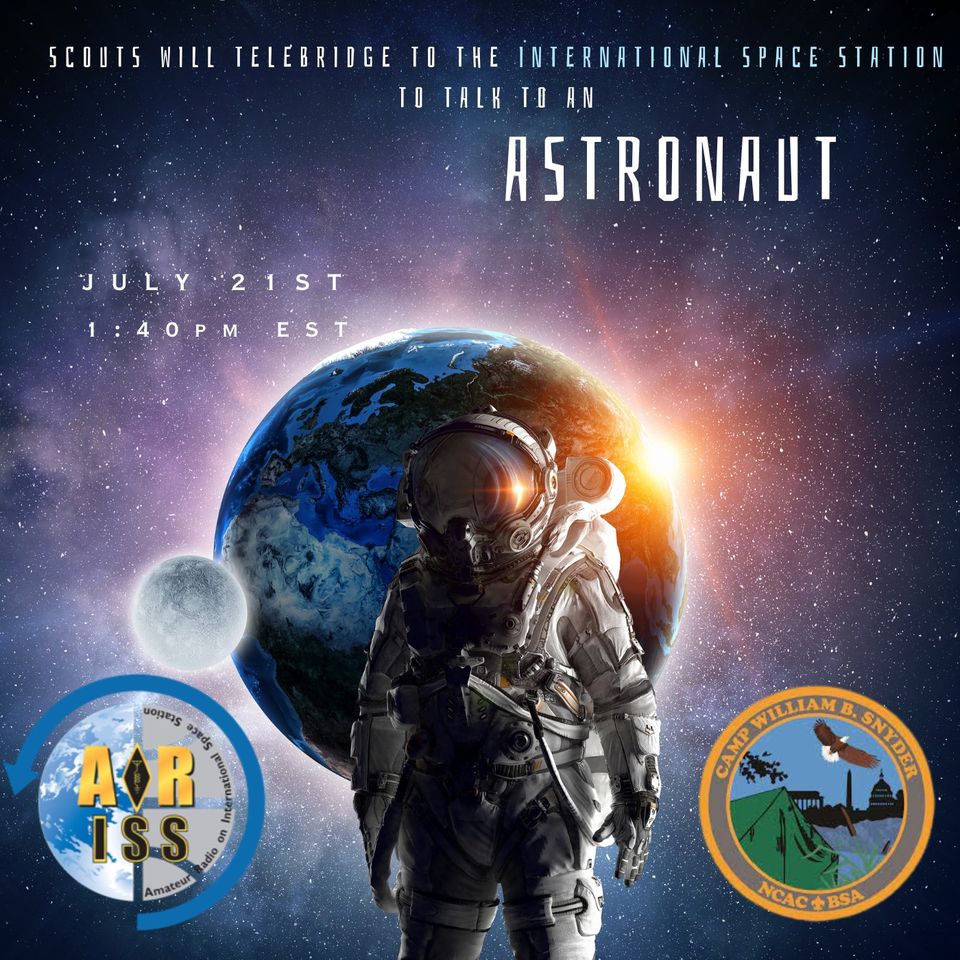
July 19, 2023, Amateur Radio on the International Space Station (ARISS) has received schedule confirmation for an ARISS radio contact between an astronaut aboard the International Space Station (ISS) and young campers at Camp William B. Snyder located in Haymarket, VA. ARISS conducts 60-80 of these special amateur radio contacts each year between students around the globe and crew members with ham radio licenses aboard the ISS.
Camp William B. Snyder encompasses 350-acres, including a managed wetland, about 50 miles West of downtown Washington DC, in Haymarket, Prince William County, Virginia. The Camp hosts nearly 5,000 youth and adults each year that include resident and day camps for Cub Scouts and Boy Scouts (Boy Scouts of America). The breadth of activities at Camp include; aquatics, shooting sports, handicrafts, hiking on nature trails, simulated rock climbing, model rocketry, woodworking and STEM learning. During the week of July 17-21, scouts have also been honing their skills and mastering tasks to earn multiple merit badges. In preparation for this ARISS contact, scouts have been learning about operating an amateur radio satellite station that is installed at the camp.
This will be a telebridge contact via Amateur Radio allowing students to ask their questions of Astronaut Sultan Al Neyadi, amateur radio call sign KI5VTV. The downlink frequency for this contact is 145.800 MHz and may be heard by listeners that are within the ISS-footprint that also encompasses the telebridge station.
The ARISS amateur radio ground station (telebridge station) for this contact is in Casale Monferrato, Italy. The amateur radio volunteer team at the station will use the callsign IK1SLD, to establish and maintain the ISS connection. The ARISS radio contact is scheduled for July 21, 2023 at 17:54 UTC.
The public is invited to watch the live stream at: https://www.facebook.com/NCACSTEM/
IK1SLD will begin its live stream about 15 minutes before AOS at http://www.ariotti.com/
As time allows, students will ask these questions:
1. Have the skillsets desired by the astronaut selection committee changed overtime?
2. Did you have to learn all the languages spoken by the individual crew members on the ISS?
3. What would you like to do when you retire from being an astronaut?
4. Have you seen any objects like debris in space ??? if so, what was that like?
5. Have you or your colleagues ever gotten sick while in space? How do you take care of yourself or get better?
6. Do you have time to pursue any hobbies while at ISS?
7. We raced blastcars in STEM Scouts this year. These are basically pinewood derby cars, with a CO2 cartridge (engine) attached to them. How would that work aboard the ISS?
8. How do you stay in touch with your family and friends while on missions?
9. Do you see more stars from the space station, than looking at them from Earth?
10. What is the long term impacts to your health by living on the ISS?
11. What does a day in the life of an astronaut look like?
12. What are some of the science experiments you have worked on while at the ISS?
13. Do you get regular time off while aboard the ISS, and what do you do during your time off?
14. Do you have any advice for young people who may be interested in becoming an astronaut?
15. Will the mission to the moon open the door for different science experiments? How so?
Media Contact:
Dave Jordan, AA4KN
ARISS PR